You can start getting involved in the entertainment industry right here at UCLA. In the second episode of this four-part miniseries, UCLA students KylieRae Condon and Katerina Bonderud join Podcasts contributors Jackson Wooton and Hela Khalil to discuss the Business in Entertainment Association and the Delta Kappa Alpha fraternity at UCLA.
Jackson Wooton: Have you ever wondered what it’s like being a student living and working in the heart of Hollywood? Well, welcome to Bruins in Hollywood, a Daily Bruin podcast miniseries where we sit down with different UCLA students working in the entertainment industry. They’ll share their experiences working in LA and advice that they have for fellow students.
My name is Jackson Wooton, and I’m here with my co-worker Hela Khalil. We’re both Podcasts contributors for the Daily Bruin. On this episode, we’ll be joined by KylieRae Condon, a child actor now participating on the film and TV executive board for UCLA’s Business in Entertainment Association. Katerina Bonderud is also joining us. She’s an executive board member for UCLA’s Delta Kappa Alpha chapter, a national professional cinema fraternity. Today, we’re exploring the different film organizations at UCLA!
Thank you all so much for being on the show today. Let’s get right into it. Could you both tell us a little bit about what each of you do for film and kind of how you got started? We can start with KylieRae.
KylieRae Condon: Yes. So I originally got into film because I started acting as a child, both in commercials and TV and some movies. And I realized acting didn’t really give you the ability to control your own destiny – you were really relying on somebody else to give you your next gig. So I got interested more in the behind-the-scenes and the business side of the entertainment industry, which is why I joined a bunch of clubs when I got started at UCLA.
Katerina Bonderud: Yeah, I’ve always really liked creative writing. I’ve published a book actually, which was a lot of fun. And I found that video editing is a lot of storytelling as well. So I got an internship in San Francisco, where I’ve edited two feature films, which were really cool for documentaries. And it was a lot of fun. It takes a lot of time. But it’s, it’s fun.
Hela Khalil: For sure. And since you guys have been involved in film for quite a bit of time, can you tell us a little bit about your favorite projects or experiences so far?
KC: There’s so many great experiences that I’ve had. I don’t think it’s necessarily like the onset experience or the film itself, but it’s the people that you meet. I mean, I met Katerina joining DKA, the film frat on campus. She became one of my best friends, and we ended up going to a Taylor Swift concert together. But I guess for more onset experience, I would say … so hard, I think one time I was able to do wires, which is where they put you on strings and lift you up into the air. And that was really cool to do. And then for behind the scenes: Recently, I did a client project with BEA where we were able to go to the NBC lot and talk about a potential marketing campaign for their new movie, “Lisa Frankenstein.” And getting to actually meet the people behind the wall with a curtain of the entertainment industry and seeing that they’re completely normal human beings was a gratifying and inspiring experience. Yeah, it’s so hard to choose because set experiences are also unique and like fun in their own way.
KB: One of my most memorable times on set was when I was filming at a – what’s it called – where planes take off. What was that called? Airport landing tarmac? Tarmac, yeah, we were filming on a tarmac, which – we didn’t really think about it at the time – but it’s really hard to film there because there’s a lot of planes going overhead. So you’d have to stop shooting. But it was really cool because I got to interview someone who has this really cool acrobatic plane. And he was such a cool guy – he knew Steve Jobs personally. And we got to go in the plane. And though they wouldn’t allow us to do flips in the air, it was really cool to actually get to know the person I was interviewing on a more personal and see what he does for fun and kind of for a living, which is really needed to get to know people on a deeper level.
JW: So throughout all these experiences, how was the process of breaking into the industry? Has it been very difficult or quite a lot of motivation?
KC: I don’t think there’s a thing, as I don’t think there is such a thing as breaking into the industry – you’re continuously breaking in. So every opportunity leads to the next, and it’s not going to be – I’ve never heard of an overnight success. Anyone I’ve heard to be very, extremely famous or successful, they had a bunch of little things that happened in their career beforehand before they had that critical, big break to be known. And even then they’re fighting for their next job and opportunity. So I would say it’s a continuous battle, but not necessarily in a negative way. There’s been a lot of good experiences, things that I look back upon. And I think it’s been very fun.
JW: It’s a very interesting perspective.
HK: I know. I often hear the term breaking into the industry being used. So that’s actually really insightful coming from someone who’s actively in the industry, so thank you.
KB: Yeah, I also feel like it’s something that you’re constantly having to stay in and fight for. Like you’re going from one job to the next. And it’s not that secure of an avenue, but you can – it’s a lot about connections and meeting some person that will introduce you to another, and you’ll pick up a lot of fun projects along the way and learn a lot about film and yeah.
JW: Have any of your skills – like, you mentioned you were a writer before – really helped the transition into film?
KB: I feel like yeah, it’s a lot about passion. And because I love writing and editing takes a long time, like hours – like I would be working for 10 hours straight. So like, just the fact that I really liked writing made it very enjoyable. I also think just having an understanding for the flow of structure for stories and understanding how to break that structure, you need to really know it before you can go off script and pave a new way in the storyline.
KC: I’d also say something that people don’t talk about enough is interpersonal skills. Like, I think the way you get your next gig is by befriending and connecting with the people that you’re working with and just being a good energy and person to be around. Almost every short film that I’ve worked in at UCLA was either within the clubs that I’m in or outside of those clubs. It’s people within there that have met me and said, “Hey, I like being around her,” and then had me tag along. So I think that’s a really important thing, having a good memory, remembering the people that you’re around, making them feel noticed, heard and connected to is super, super important.
HK: Yeah, since connections are such a big part of the industry. And because both of you are obviously students here at UCLA, can you tell us a little bit about the film clubs that you’re involved in and what led you to join them?
KB: So we’re in DKA or Delta Kappa Alpha here at UCLA. It’s the Delta chapter. So I joined DKA because I was very drawn to the connection of the community. I feel like there’s a stereotype that film people can be a little bit snobby about their film, like film favorites, as well as what’s the best way to like make a film and et cetera. DKA was so welcoming. Everyone was so creative, bringing their different skill sets. It was such a nice avenue to get involved in the film industry, without actually being a part of TFT here on campus. And what’s made me stay is definitely the community and all of the fun times we’ve had on sets every quarter.
KC: DKA for me was fate – which, I don’t even believe in fate – literally standing in the dining hall talking about how I only knew of one film club on campus that was really big. And considering UCLA is such a big school, I wanted to join a smaller, maybe slightly more connected community. And I just said out loud to my friend, “I wonder what other film clubs are here.” And a stranger turned around and said, “Hey, have you ever heard of, like, the film fraternity on campus? You should join.” And rush was the very next day. So without that little interaction, I would have never known about it. And it actually changed my life for the better. I’ve got a lot of opportunities to work within different positions on set, things that I would never expect myself to do, whether that’s helping with lighting, sound producing, assistant directing – there’s just been a lot of opportunity. So it’s been pretty robust.
JW: Are positions in these organizations a big part of the organization, and do y’all hold any yourselves?
KC: Yes, I would say most people take on at least one leadership opportunity. It’s not something that’s necessarily competitive. There’s a real emphasis on just trying to get out there and take initiative. For me, I’m something called the cinematic affairs chair, which is basically the person in charge of getting the films done. So I helped produce the music video we did last quarter, every short film that happens. I’m also in charge of industry education, which means getting guest speakers involved to actually talk to students, as well as facilitating the writing workshops. Now we don’t do that alone. It’s all about like teamwork. I have a co-chair named Tavish, and then Kate and West also help out, but those are my main initiatives.
KB: Yeah, I would say DKA is definitely very community-based, and everyone’s pitching in in their own way. There’s a lot of leadership positions you can take. And I’ve been a pledge education as well as social chair. And I feel like my role is just to like help connect the community more and more. And as pledge education, I had so much fun welcoming people into the community and teaching them about film as well as the fraternity itself, which was a lot of fun with social chair. I’m putting on so many fun events like any other social fraternity would.
KC: We’re roasting marshmallows soon.
KB: Oh, yes, going to the beach.
KC: And there’s also smaller positions. We have sunshine chair, which is in charge of like bringing snacks to meetings so that we’re fed. So there’s a bunch of opportunities there.
KB: Yeah. I would also say something pretty special about the club is that you get a lot of connections once you’re in it to people in the industry. We have a really cool alumni network. So like, Steven Spielberg is an alumni of us, and it’s like you have connection to these people, as well as jobs and internships, which is really cool, really helps because it can be pretty daunting going into the film industry. But also, I’ll say it time and time again, just the community. It’s so fun. Everyone’s so close.
JW: And you’ve mentioned a lot about DKA. I have a question for you, KylieRae. You’re also in BEA, do you want to touch on that a little bit?
KC: Definitely. Definitely. Definitely. I joined BEA this year as a sophomore. And the way it works is there’s a committee, which is a smaller group of people that work on client projects. They have a music committee, a fashion committee, a digital media committee, which is like implementing social media, and then a film and TV committee. And we’re all partnered with big companies in order to help them with their business practices and brand strategy. Right now, as a part of the film committee, we’re working with NBC Universal. As I said earlier, we help them with their marketing campaign for “Lisa Frankenstein.” But we’re going to be meeting with them literally next Tuesday to talk about how they can improve their newsletter, their marketing strategies and some of their business practices to appeal to Gen Z. And there’s a lot of opportunity to grow within the organization just because of how many leadership positions are available. And I like the fact that it’s tight-knit, but if you don’t want a leadership position, you can still sign up to be a general member and go to a lot of their guest speaker events as well.
HK: That’s actually really great, because I feel like a lot of the film-centered organizations are kind of focused on the actual creative process of making films and writing scripts and all of that. But BEA is focused a lot on the business side of things, which is so overlooked.
KC: 100%. Yeah, and it’s half the industry. And even as a creative, you need to understand the business side in order to sell your artwork and make yourself known. And I’d also like to say that there’s so many people from different majors within my committee, there’s been econ majors, sociology, psychology. We even have some STEM people involved. It’s not exclusive to just business people. I think, really, the main thing is you just have to be interested in the entertainment industry itself.
JW: I have a question about exclusivity. You mentioned how it’s like kind of like a very close, connected community. And there’s a lot of overlap between the clubs. Would you say it’s difficult to kind of get involved in the communities at UCLA?
KC: It depends. I do think you need to put yourself out there in order to be known just because UCLA is so vast, but it’s definitely possible. I’ve seen so many different types of individuals, whether more quiet, shy, be able to be a part of a community. And there’s just so many different people that are attracted to film in itself. So you’re bound to find somebody who is similar to you.
KB: Yeah, I feel like there’s so many different people in DKA, as well as people who go through the rush and pledge process. I think it’s a lot about passion. And if you really like film, like you have a good shot. And I feel like as we’ve been growing, it’s been getting more and more diverse as well, yeah.
JW: Oh, speaking of DKA, I did see – I was looking through your website, and I saw that y’all have papers and short films, is that correct? Can you go into more of what y’all create?
KC: We make short films every quarter. And then we also make music videos. And it is fully written, produced, directed, edited by DKA members. And essentially, what happens is we send out a form to gauge interest of who wants to do what position, and it’s all about learning. That’s the emphasis. So even if you haven’t done a position before, that’s OK. We try to assign you and give you a contact of somebody who actually has done your position before so you can be in contact with them to have a better understanding of what your job entails. I think some of the other film clubs on campus don’t really do that. It’s not as focused on making sure you understand the process. And then we shoot it on a weekend.
KB: Yeah, I think what makes it very accessible is we have what we call learning sets. So like anyone, you don’t have to have any experience in film. And you can work on the set. Like there’ll be like the main person in a position like the main editor, or the main cinematographer, the DP. And then you could have an assistant position to that. So you can learn a lot about that position, and then break into it that way.
KC: And also, can I just say one thing for BEA? They recently installed an internship program. So the same thing of, if you don’t have any experience within the business side of the industry, they have a preparatory program to make sure that you can one day be a part of all the committees,
JW: That brings up a good point, what is kind of the application process for these kinds of clubs?
KC: It depends. Like some clubs on campus, you just have to show up, which is fabulous. Those tend to be a bit bigger, so they have a broader community. But if you want something that’s a little bit more tight-knit, it tends to require an application. For DKA, It’s literally a Google form and a week of rush, which essentially is two hours for a couple of days. We have a bunch of bonding activities like via, we have sweets, sweets that we eat together, and talk to connect. Again, it comes down to the interpersonal skills of “I want to be around you. I want to make a film with you.” And then as for BEA, it is an application. It’s a form. You fill out a couple questions about why you want to be a part of BEA, some of your ideas you have for the club, and then the directors of the committee would look at it. And then there’s an interview process, but that was also very easy. It was like a 10-minute interview. Super simple.
HK: How has being involved in film clubs at UCLA helped you kind of jump-start your professional careers or your endeavors?
KB: I think being on DKA sets has taught me so much about different aspects of film, especially on set. So many aspects to it. It’s crazy, and it’s given me a lot of confidence because I feel like it can be really intimidating to be on a set for the first time. The first set that I went on for DKA, I was like, behind-the-scenes photographer, and I learned so much and got so excited. And all of these people wanted me to learn about all the aspects of film. So I feel like confidence is such a big thing. And it helped me so much with that, and as well as just like believing in myself, like, “OK, these people are doing it. I can do it, too.”
KC: Yeah, I think what it did is it gave me the feeling that I’m not alone. The entertainment industry is about facing continuous rejection, whether that’s applying to internships or professional experiences. And having people our age at the same school go through the same things is a really supportive experience, being able to talk about the internships that we get rejected from, or even going through interviews for jobs and actually becoming an adult, it’s nice to have people that are having those similar experiences, and that we’re all succeeding but also simultaneously failing in some areas within the film industry. And we’re just continuously learning.
KB: Yeah, everyone’s trading info that they’ve learned. Yeah, we have this thing during meeting called recognizing people. Yes. And so we recognize people for what they did on site, or whether they got an internship or had an interview. So it’s all about recognizing and celebrating other people’s successes and experiences, which is nice.
JW: Do you have advice for students wanting to work in the industry through organizations or clubs like DKA and BEA?
KC: Not to be the meme, but just do it.
KB: Like, genuinely, I was going to say the same thing. Like, you just got to put yourself out there. Like, you’re bound to get rejections and you just gotta keep going forward. Because eventually you’ll like, land a job that you’re super excited about. And like, honestly, it’s been really uplifting to see how many people have like, put themselves out there. And they, like actually get like a Warner Brothers like internship, which is just awesome.
KC: I also think every time that I, quote-unquote, “give up,” like, “Oh, it’s not going to happen,” is right when it happens. I applied to so many internships, and I wasn’t even getting interviews. And then finally I got one interview. It was the last internship I was willing to apply to, and I ended up getting that one. So it’s all about having that perseverance. I once heard a guest speaker. I think he was from Fox. And he says the key to success is not always talent – a lot of it is perseverance. It’s willing to try when no one else will.
KB: Yeah, like not to sound cheesy, but every fail that you get is one step closer to a success.
KC: And also surrounding yourself with people who are interested in film, because if one of your friends with people, you know, become successful, they can pull you up along the way. And that’s a great experience as well.
JW: Do you have tips for staying motivated, especially in like an industry such as film?
KB: Something I’ve heard from a lot of film professors as well as people in DKA is, it’s really important to surround yourself with people who are your same age and going through the same stages and film because you may fail, and then your friend fails, and then build each other up and then try again. And eventually, you’ll keep growing and getting better and better landing internships and jobs together. And that connection is really crucial for the film industry as well as having people at other levels. So having a mentor of some sort that is much older than you and having a lot of insight on the industry, because you might have an idea of what something like a good, OK, you might have a good idea about how to go about something and then someone who’s been in the industry is like, “Oh yeah, don’t do that.” So it can be helpful.
KC: Actually, that just reminded me of something. I’m pretty sure UCLA has a mentorship program through the alumni network, and you can connect yourself to an alumni within the film industry. So that’s a great resource. But I would say my biggest piece of advice, which is going to sound counterintuitive, is have a life outside of film. Have other things that bring you joy. And from that, not only will the rejection feel a lot softer, and not as prominent, but also, it’ll inform your filmmaking. Like if you’re a tennis player, and you’re really great at tennis, and you dive into that, that can inform your storytelling. You can make a film or documentary about tennis. And I think it’s just about being a more diverse person – it will not only help you with the failure but also the filmmaking itself.
KB: There needs to be a balance for sure because it can really overtake your life.
JW: How has the work-life balance been? For clubs and in school and, actually, what are y’all’s majors? And then also internships, et cetera.
KC: Yes, I’m an econ major, and then I’m a film minor.
KB: I’m a double major with sociology and philosophy.
KC: I would say my workload has been a bit tough just because math isn’t a natural strong suit for me. It’s been a little bit tough to balance with both school and internship. I will say that UCLA does offer academic credit for internships, which has been very pivotal for me. And that’s been allowing me to take only two classes plus an internship course. And without that, I don’t think I’d be able to do the internship on top of my classwork, just because it’s so much time. And then on top of producing movies, within short films and working on the business side of the entertainment industry, it’s just a lot. So it’s a little difficult to manage, but because I love it, it’s manageable.
KB: Yeah, I feel like that’s a really good point. I know, as much as I love to really deep dive into film, as well as academics, like there, like I said before, has to be a balance where you get some time to yourself, like taking care of yourself. I think sociology has specifically helped me a lot with understanding interpersonal connections, as well as social dynamics, which has been something really fun to implement in my stories that I create, whether I’m writing them or just trying to understand interactions on a set between two actors or an actress. And what’s also cool is when you take film classes at UCLA, you’re bound to see all the people in your clubs. So yeah.
JW: I have a last question. How has the industry been evolving in terms of diversity? I know DKA has a big push for gender inclusivity specifically.
KC: There’s definitely an emphasis on inclusion. Of course, there needs to be more and more as the world is changing. We even have a position within our club that’s all about being inclusive and trying to improve a diverse range of opportunities for all members and to meet people where they’re at. I would say our club is pretty diverse. What do you think, Kat?
KB: I think it’s pretty diverse. Like there’s always room for improvements. I think, especially during the rush and pledge process, we really make a push for accessibility on all levels, whether it’s physical, where you come from, everything, because we want it like someone who’s interested. If you want to be a part of the community you have an opportunity to, and that’s why you need no prior experience.
KC: And then as for BEA, it’s the same way – you don’t need any prior experience. And I would say both these clubs are way less, quote-unquote, “competitive,” than most of the clubs I’ve seen at UCLA. Like a lot of the pre-professional business organizations, or even like pre-med that are very cutthroat, like to have like a rubric on who gets accepted and who doesn’t. That’s not the way film clubs work. It’s much more on a person-to-person basis.
JW: Yeah. Well, I’m really glad to see how expansive and inclusive the film industry has been at UCLA.
HK: Yeah, thank you guys so much for joining the podcast today – were really insightful. And it was a really great conversation.
KC: Thank you. Happy filmmaking.
JW: Thank you for joining us today. We also want to thank our guests, Katerina Bonderud and KylieRae Condon. And we want to thank The 529s again for creating the music for today’s episode. You can listen to Bruins in Hollywood on Spotify and Apple Podcasts, and a transcript of this show is available at dailybruin.com. See you next time.
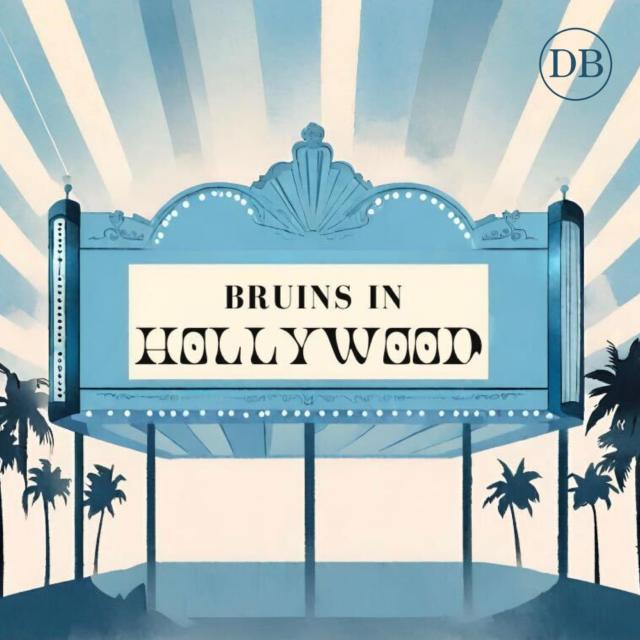

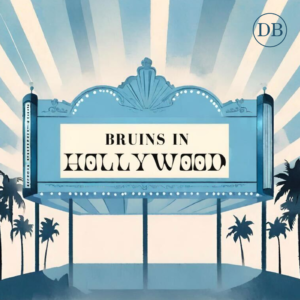
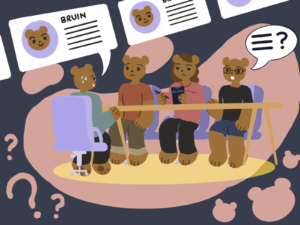
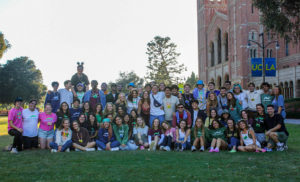
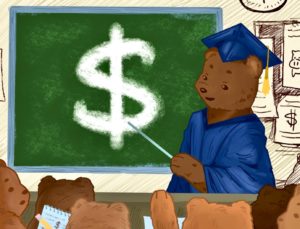
Comments are closed.